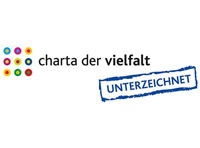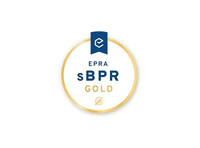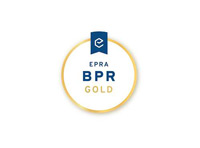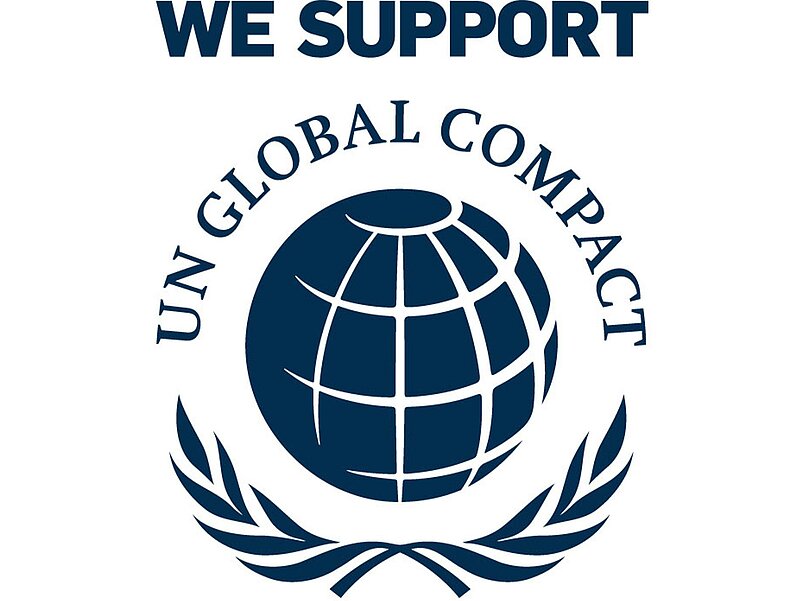EPRA Sustainability Best Practice Recommendations
General recommendations
Introduction
Company profile
LEG Immobilien SE is a housing company focusing on the housing market of the economically strong state of North Rhine-Westphalia and its neighbouring federal states. Our portfolio comprises around 166,500 rental properties (approximately 500,000 tenants) with an average apartment size of 63 square metres and 1.550 commercial units. Our focus is on affordable housing, and our units help to meet the demand generated by the rapid rise in the number of smaller households that are typical for our market.
Our core business is the management and development of our own residential portfolio. The business model is also being actively expanded to include innovative services and new revenue models.
Headquartered in Düsseldorf, the Group had around 2,000 employees in 2023. Our properties are held by a number of LEG subsidiaries.
Since 2017, we have been reporting our performance in the areas of society and the environment and continuously expanding the scope of indicators and properties included in our reporting.
We are a member of EPRA and prepare our environmental and social reports in accordance with EPRA's Best Practice Recommendations on Sustainability Reporting (sBPR) in addition to other recognied reporting standards. Our report is divided into two sections:
1. General Recommendations
2. Performance Report
1. General Recommendations
System boundaries
We have selected operational control as the criterion for defining our system boundaries. Reporting therefore only covers the properties over which we have operational control, and the utility services that we source directly as a landlord for communal areas, central services or rental areas. The only exception is data on heating energy, which was collected or extrapolated for all rented properties. For the individual performance indicators, the following share of the property portfolio is within our system boundaries:
- Electricity: We are responsible for the purchasing/settlement of all electricity consumed for common areas in the property portfolio under our management.
- Fuels, district heating and district cooling: We are responsible for the purchasing/settlement of all fuels or district heating for around 56 % of the property portfolio under our management (2022). Furthermore, we requested and collected around 6 % actual data from third-party utilities for 2022. Around 37 % of the remaining missing data was calculated using projections based on the energy certificates and around 1 % based on the building age cluster.
- Water: We are responsible for the purchasing/settlement of all water consumed in the property portfolio under our management.
- Waste: We are responsible for the removal and disposal of the waste generated by the rental properties for the entire property portfolio under our management.
- Employees: The reporting relates to all persons employed directly by LEG, including its wholly owned subsidiaries LEG Wohnen NRW (which is responsible for the operations management of our properties) and LEG Management (which monitors all corporate governance areas). Employees at joint ventures, such as TechnikServicePlus (TSP), are partially excluded as they are not fully under our operational control.
- Site health and safety and community betterment: In all the properties under our management, we are responsible for performing health and safety inspections, for compliance with regulations and for the betterment of the community.
- The governance data relate to LEG’s Supervisory Board and its Management Board.
Data collection
Unless stated otherwise, the absolute performance indicators for fuel consumption, district heating and district cooling, building certification, site health and safety and community betterment relate to 100 % of the apartments that fall within the system boundaries defined above.
The data collected for electricity consumption relate to 97 % of the apartments within our system boundaries (2022: 97 %).
The water data collected relate to 46 % of the apartments within our system boundaries. The other 54 % are excluded as we have no consumption data for them.
The waste data collected relate to 27 % of the property portfolio under our management. For these apartments, we use our own service provider that is entrusted with waste management and collects data on the waste volumes generated. These data are then converted into tonnes using a conversion factor.
Estimates of utility services billed to the lessor
The data on electricity and water for 2023 are entirely estimated as the actual consumption data were not yet available by the editorial deadline. These estimates were made by calculating the absolute data and consumption indicators on the basis of the consumption data for 2022 and extrapolating this to reflect disposals and additions in 2023.
The data for heating and fuels for 2023 are based on estimates as the actual consumption data were not yet available by the editorial deadline. The estimates are based on the results of the 2022 carbon footprint, less disposals in 2023, plus additions in 2023.
The estimates for electricity, water, heating and fuels for 2022 used in the previous year were replaced by the actual consumption data for 2022.
The waste data are reported by a service provider that operates as the waste manager for around 27 % of our property portfolio. The combined volumes of the waste containers provided for these properties by LEG were analysed. These volumes are not always the same as the waste containers’ actual fill volumes. Also, these figures do not add up to the actual volume of waste at these properties, as some of the waste is disposed of in public containers which are emptied directly by the local council.
The volumes collected in the waste containers provided by LEG are converted into tonnes using general conversion factors for the various types of waste. These conversion factors were marked up by 10% as the waste containers hold an above-average volume of waste (except organic waste) thanks to the service provider’s active waste management. Conversion factors: residual waste: 0.11 t/m³; recyclable materials: 0.033 t/m³; paper, card, cardboard packaging: 0.22 t/m³; organic waste: 0.25 t/m³).
Boundaries – Reporting on consumption billed to the lessor and the tenant
The data for electricity and water relate only to the consumption (based on metre readings and bills) that LEG purchases as the lessor for communal areas/central services or private apartments (and which is subsequently billed to the tenants). Data that are billed to tenants directly (i.e. bills that tenants receive directly from their provider) have not been taken into account.
Analysis – standardisation
We have calculated the consumption indicators on the basis of floor area (square metres) for entire buildings, including rental apartments. We are aware that our method for calculating consumption indicators has a discrepancy between the numerator and denominator, as we only receive electricity bills for communal areas, but the bills for fuel, district heating, district cooling and water consumption for communal areas/central services and rental areas (it is not possible to separate these consumption data).
Performance indicators for health and safety are calculated using the following formulae:
- Injury rate = number of reported injuries/total number of work days
- Work loss rate = number of work days lost (from three and upwards) due to workplace injury/total number of work days
- Absence rate = number of days missed due to illness/total number of work days
Analysis – segment analysis (by property type, geographical location)
The segment analysis is based on the property classification used in our financial report (see 2023 annual report). Our investment portfolio comprises around 166,500 apartments and 1,550 commercial units.
In our segment analysis, we do not distinguish between residential and commercial units as they are located in the same buildings and therefore the consumption billed to the lessor cannot be separated.
A further segment analysis by geographical location is not relevant as 85% or our apartments are in North Rhine-Westphalia and the remaining part in other German states and are therefore in the same climate zone.
Period of reporting
Absolute performance indicators and consumption indicators relate to the last reporting year (2023). Like-for-like analysis of the performance indicators for electricity, water and heating energy relates to the last two years for which we were able to collect actual consumption data (2022 and 2021). As we only use actual consumption data, we can analyse the effects of efficiency improvements in our like-for-like portfolio, which would not be possible with estimated data. For further information, see “Estimates of utility services billed to the lessor”.
However, the like-for-like analysis for waste relates to the years 2023 and 2022 as the corresponding waste volumes are available for these years.
Information on administrative buildings
All administrative buildings are reported from the 2023 calendar year onwards. Information was provided from twelve locations, both internally and externally rented properties.
Data are recorded for 100 % of our space and all available consumption data are reported.
The combined volumes of the waste containers were analysed to calculate the waste quantities. These volumes are not always the same as the waste containers’ actual fill volumes. The volumes are converted into tonnes using general conversion factors for the various types of waste.
Data review and quality assurance
All data calculated are checked for consistency and coherence before being added to the reporting database. There is no external review or quality assurance at this time.
Performance Report
Environment action area
Energy consumption and emissions
Based on the 2022 reporting year, energy consumption and emissions were extrapolated for the 2023 reporting year by adjusting for the portfolio changes in 2023.
The electricity consumption figures are based partly on measured data and partly on extrapolations from the costs posted on the basis of samples.
The energy consumption billed to the lessor rose slightly across the property portfolio as a whole in 2023 as a result of portfolio changes: Electricity consumption billed to the lessor decreased by 0.24 %, with decreases of 3.88 % and 3.29 % in fuel and district heating consumption billed to the lessor. The energy consumption indicator for our property portfolio has decreased by 2.7 %.
Scope 1 emissions declined accordingly by 0.15 %. Scope 2 emissions rose by 0.15 % in the location-based analysis and by 0.14 % in the reported market-based analysis. Based on the consumption indicator, climate-adjusted Scope 1 and Scope 2 emissions for heating energy decreased to 32.6 (location-based) and 27.3 (market-based) in kg CO2e/m²/year.
Scope 2 emissions, based on electricity billed, increased by 0.24 % as against 2022. The consumption indicator is unchanged at 0.36kg CO2e/m²/year.
In the like-for-like analysis (calculated on the basis of the actual consumption data between 2022 and 2021), the energy consumption declined slightly by 0.06 %. There was a minor reduction in heating energy consumption. For fuels, the value of energy consumed decreased by 5.49 %; for district heating the value decrased by 0.74%.
In the like-for-like analysis, GHG emissions increased by 91.15 % in relation to Scope 2 electricity emissions. Accordingly, the consumption figure also increased by 94.44 %.
Scope 1 emissions decreased by 8.98 % and Scope 2 increased by 1.58 % (location-based), respectively by 4.92% (market-based) due to the switch from fuels to district heating. In terms of the consumption metric, this trend in Scope 1 and Scope 2 heating energy emissions in kg CO2e/m²/year can also be seen: The metric decreased by 10.56 % on a location-based basis and decreased by 11.10 % on a market-based basis relative to 2021. Scope 3 emissions for upstream heat (3.03) were 45 tonnes of CO2e and 168 tonnes of CO2e for household electricity (3.13). This corresponds to a reduction of 6.78 per cent compared to the previous year.
Further information on our measures to reduce energy consumption and GHG emissions in our portfolio can be found from > page 118, Environment action area in our annual report.
Water
Absolute water withdrawal was reduced by 0.24 % as against 2022 in 2023. The water withdrawal parameter remained stable. Like-for-like, the water withdrawal went down by 3.06 % between 2022 and 2021. The water withdrawal parameter indicator thus rose by 3.54 % in the like-for-like analysis. All water comes from the municipal water supply.
Further information on our water management activities in our property portfolio can be found in our Water Policy at www.leg-wohnen.de/en/corporation/sustainability/codes-and-guidelines/policies/water-guideline
Waste disposal
The total weight of waste collected in the 27 % of apartments for which we collect data rose by 2.24 % between 2022 and 2023. 60 % of this is residual waste, of which only a small amount is sent to landfill, while the majority of what remains is burnt for energy recovery in waste incinerators. Like-for-like, the total weight of waste collected in the apartments for which LEG was able to gather corresponding data, remained constant between 2022 and 2023.
The relatively low level of data available for waste data and the calculation methods used make it difficult to draw conclusions concerning our overall performance. Nonetheless, we are using various activities to raise tenant awareness and to reduce waste volumes.
Building certification
Building certification relates to energy certificates currently available for around 96 % of our property portfolio (based on floor area). The majority of individual apartments (around 83 %) have an energy efficiency certificate in the efficiency classes D to H, which is due to the relatively high age of our buildings. A slight improvement has been achieved in our property portfolio since 2018 thanks to the ongoing energy modernisation programme.
Society action area
Diversity
LEG makes efforts to ensure a balanced workforce structure and gender equality. Around 34 % of our direct employees and 20 % of our managers are women. The ratio of the basic salary and remuneration of women to the basic salary and remuneration of men in relation to all employees is 97 %; at management level the figure is 85 %. The differences relate exclusively to length of service and seniority.
Further information on our approach to diversity can be found in our Employee and Diversity Policy at www.leg-wohnen.de/en/corporation/sustainability/codes-and-guidelines/policies/employee-and-diversity-policy.
Training and continuing professional development
LEG actively promotes initial and further training, and supports its employees’ continuing professional development. In 2023, each employee completed an average of around 15 hours of training on various compliance and professional issues and on development options. Just over 83 % of employees also took part in an annual professional development interview. These interviews take the form of a dialogue between employees and managers, and provide an insight into the employee’s skills and knowledge. Employees are also given the opportunity to talk with their supervisors about any support they would like, how satisfied they are in their work and how they would like to continue developing within the company.
Further information on our approach to employee training and continuing professional development can found in our Training and Continuing Professional Development Policy at www.leg-wohnen.de/en/corporation/sustainability/codes-and-guidelines/policies/training-and-further-education-policy.
Turnover
212 new employees were hired in 2023, corresponding to a new hire rate of around 10.4 %. At the same time, 227 employees left the company, which translates into a fluctuation rate of 11.2 %. Further information on initiatives in relation to our employees in the areas of employee engagement, satisfaction and retention can be found in the Training and Continuing Professional Development policy referred to above. www.leg-wohnen.de/en/corporation/sustainability/codes-and-guidelines/policies/training-and-further-education-policy
Health and safety
Given the type of work, LEG classifies the risk in the area of employee health and safety as low in general. This was confirmed by an injury rate of 0.0002 % in 2023 and work loss rate of 0.13 %. The most frequent reason for time off is illness. We had an absence rate of 6.9 % in 2023.
LEG systematically and comprehensively guarantees site safety, using both its own employees and service providers who inspect and check buildings and facilities. Around 99.7 % of our property portfolio underwent such a health and safety review in 2023. Tradesmen were booked immediately if there were any reports, defects or accident risks. After work was completed, it was checked and documented that the problems had been resolved.
Further information on our approach to employee and tenant health and safety can be found on page 114 (Tenants action area) and from page 116 (Employees action area) of our annual report.
Community betterment
In 100 % of the property portfolio under our management, we organise community betterment activities. These activities include a wide range of measures aimed at enhancing tenant satisfaction, promoting social cohesion, encouraging people to be good neighbours, boosting local communities and responding to social challenges.
Further information on our approach and examples of the many initiatives that we carried out in our property portfolio in 2023 can be found from p. 120 onwards, under "Society", and from p. 114 onwards, under "Tenants".
Governance
Extensive background information on our governance performance indicators, a profile of the Supervisory Board and a description of our nomination processes and the way we handle potential conflicts of interest can all be found on page 23 f., page 36 f., and p. 94 f. of our current Annual Report and at www.leg-wohnen.de/en/corporation/leg-group/members-of-the-management-and-supervisory-board and www.leg-wohnen.de/en/corporation/sustainability/codes-and-guidelines.
Mr Michael Zimmer, as the Chairman of LEG’s Supervisory Board has extensive social commitments and has initiated or himself founded various foundations. Mr Zimmer is the Chairman of the Board of Trustees of these foundations: Your Home Helps – Foundation of the LEG Immobilien Group www.dein-zuhause-hilft.de, CORNELIUS – Foundation for the Children of Addict Parents www.cornelius-stiftung.de, Der bewohnte Garten – Foundation for the Promotion of Contemporary Art www.derbewohntegarten.de. He is therefore an expert in the areas of the environment and society. All three members of the Management Board are therefore experts in the areas of the environment and society.
Disclosure of EPRA performance indicators for sustainability
All administrative buildings are reported since the 2020 calendar year onwards. Information was provided from eleven locations, both internally and externally rented properties. In previous years, only consumption of the headquarter in Düsseldorf was reported.













